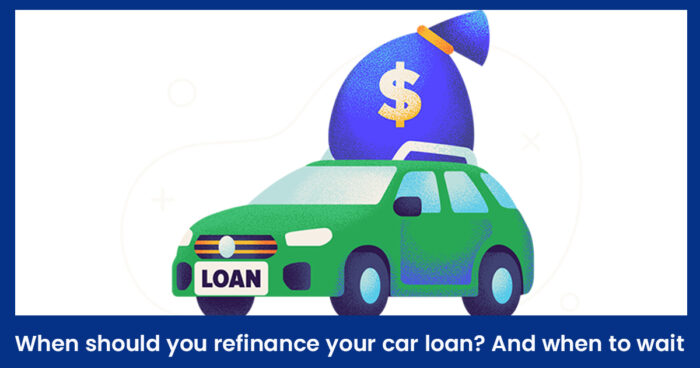When should you refinance your car loan? And when to wait – Refinancing your auto loan can be a smart move if it helps reduce your interest rate or lower your monthly payments. It involves replacing your existing loan with a new one that has better terms. Even if rates haven’t dropped dramatically, there are still good reasons to consider refinancing.

Choosing the right time to refinance depends on current market rates, your financial situation, the condition of your car, and how much you still owe. However, it’s not always the best move. If you’re close to paying off your loan or interest rates are high, refinancing may not save you money. Understanding when it helps and when to wait can make a big difference in your long-term financial plan.
Refinance When You Can Get a Lower Rate
Refinancing makes sense when interest rates are low. For example, refinancing a $12,000 loan from a 15 percent APR to a 7 percent APR over four years could reduce your monthly payment from $334 to $287. That’s a $47 monthly savings and more than $2,200 saved in interest over the life of the loan.
Even if the Federal Reserve’s rate changes don’t directly impact auto loans, lender rates usually follow similar trends. When inflation slows and lending conditions improve, better refinancing options become more available.
When Your Credit or Financial Profile Has Improved
If your credit score has gone up or your debt-to-income ratio has improved, you could qualify for better terms even without changes in the market. A small credit improvement can mean a big difference in rates.
To raise your score quickly, consider paying off high credit card balances. This improves your credit utilization ratio and lowers your debt-to-income ratio, which lenders like to see.
Here’s what average used-car interest rates look like depending on your credit:
- Scores 781–850: Around 6.8 percent
- Scores 661–780: Around 9.1 percent
- Scores 601–660: Around 13.7 percent
- Scores 501–600: Around 19 percent
- Scores 300–500: Over 21 percent
A strong credit score can save you thousands in interest over the life of a loan.
If Your Original Loan Was from the Dealer
Many people take loans through the dealership, often at higher rates. If your original loan came with dealer markups, you may benefit from refinancing through a bank, credit union, or online lender with more competitive rates.
If You’re Struggling With Payments
If your income has decreased or expenses have gone up, refinancing can lower your monthly payment. This often means extending the loan term. While this could increase the total interest paid, it can ease your budget now.
Some lenders offer terms as long as 84 months. To reduce the long-term cost, consider making extra payments toward your principal when you’re able.
If You Have Positive Equity in the Vehicle
Having equity means your car is worth more than what you owe. Lenders see this as lower risk, so you may qualify for better terms.
Let’s say your car is worth $20,000 and you owe $15,000. That’s 25 percent equity, which could improve your chances of approval and help you get a better rate.
When Refinancing Might Not Be Worth It
Refinancing isn’t always the best option. There are times when you may want to hold off or avoid it completely.
If You’re Close to Paying Off Your Loan
If you’re nearly done with your payments, refinancing won’t save much money. Lenders often require a loan term of at least two to three years. If you don’t meet the minimum, refinancing may mean extending your term and paying more interest overall.
Also, some lenders set a minimum balance for refinancing, usually between $3,000 and $7,500. If your remaining balance falls below that range, you may not qualify.
If You Owe More Than the Car Is Worth
When your loan balance is higher than your car’s value, you are upside down or “underwater.” This makes it harder to refinance because lenders are less likely to approve loans that don’t have enough collateral.
Unless refinancing actually saves you money or improves your terms significantly, it may not be worth doing when your equity is negative.
If Interest Rates Are Rising
If you locked in your original loan when rates were low, you may not get a better deal now. Refinancing into a higher rate just to extend your term can cost more in the long run.
Still, if your current payments are too high to manage, refinancing might help avoid missed payments or damage to your credit.
If You Don’t Meet the Lender’s Requirements
Lenders set their own rules for refinancing. Most want to see a consistent income, a good credit score, and a low debt-to-income ratio. They will also evaluate your car’s age, mileage, and value.
Your car will usually need to be less than 10 years old and under 100,000 to 150,000 miles. Be sure to check your current loan balance and the lender’s minimum refinancing amount before applying.
Final Tip
Before refinancing, take time to compare lenders and run the numbers. If refinancing saves you money or helps you manage payments better, it could be the right move. Just make sure you understand the full cost and long-term impact.



